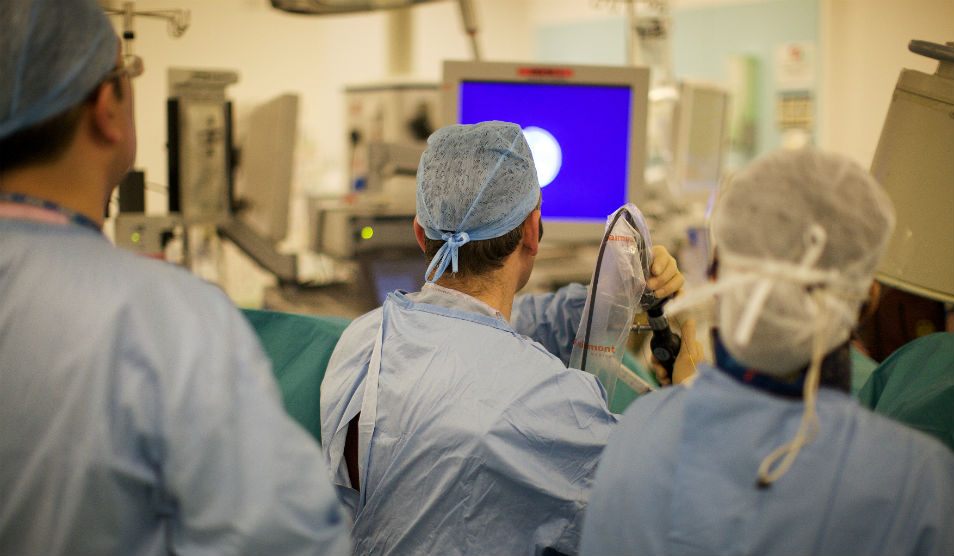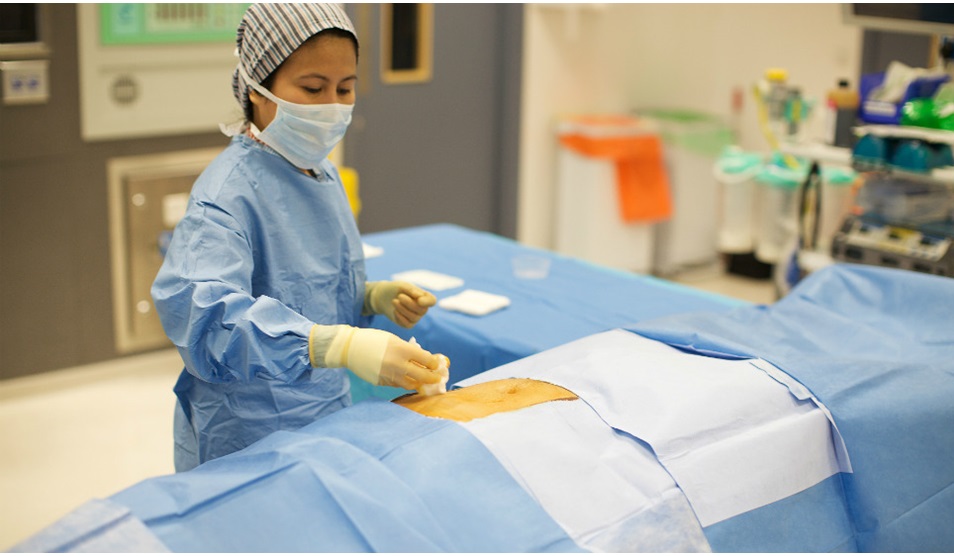Bariatric surgery
Contact
- Outpatients appointments
- 020 3313 5000
Visitor Information
Translation help:
To translate this page into your preferred language, click the Google Translate icon in the top-right menu and select your desired language.
Service update: Changes to specialist weight management pathwaysEffective from 19 September 2024, our service will no longer provide the Tier 3 Dietitian-led 8-week specialist weight management programme due to increased service demand and changes in commissioning arrangements. This aligns with the National Institute for Health and Care Excellence (NICE) guideline – |
About our weight management services
The Imperial Weight Centre, based at St Mary’s Hospital in London, is a leading provider of weight loss (bariatric) services. We deliver comprehensive medical and surgical care to patients from across the UK who are living with obesity and related health conditions.
Our primary goal is to improve health outcomes through effective, evidence-based weight loss treatments.
Our approach
We provide a thorough assessment for all patients to identify any obesity-related health conditions. These may include:
- Type 2 diabetes
- Obstructive sleep apnoea (OSA)
- High blood pressure /Cholesterol
- Polycystic ovarian syndrome (PCOS)/Subfertility and Infertility
- Heart and lung issues related to obesity
- Intracranial Hypertension
We take a holistic approach to treatment, involving a multidisciplinary team of experts from across our hospitals to ensure each patient receives the highest standard of care.
Treatments and procedures
We specialise in minimally invasive (keyhole) bariatric surgery, which allows for faster recovery and reduced hospital stays. Our surgical options include:
- Gastric bypass: Reduces stomach size and bypasses part of the small intestine, limiting food intake and nutrient absorption.
- Sleeve gastrectomy: Reduces the size of the stomach, helping patients feel full more quickly.
All treatment plans are personalised, based on medical history and individual needs. Each case is reviewed by our multidisciplinary team to ensure the safest and most effective outcomes.
What to expect
- All surgical procedures are tailored to the patient’s specific health needs.
- Patients undergoing gastric bypass or sleeve gastrectomy typically stay in hospital for one to two nights.
- Patients can also meet others who have undergone similar treatments at our centre.
Bariatric surgery has been shown to significantly improve other obesity-related conditions:
- Up to 50% of patients with acid reflux no longer need treatment after surgery
- Around 40% experience reduced joint pain or osteoarthritis symptoms
- Approximately 40% report improvement in urinary incontinence
Excellence in care
The Imperial Weight Centre is proud to be one of the few centres in the world accredited as an International Centre of Excellence (ICE) for bariatric surgery – and the first in the UK to receive this distinction.
Contact information
- Contact number for admin team: 020 3312 6449
- Admin email address: imperial.bariatrics@nhs.net
- Bariatric surgery nurses emergences: 07826859741
If you have any concerns, complaints, or feedback regarding your care, please contact our Patient advice and liaison service (PALS).
Address
Surgical Outpatients2nd Floor, Main Outpatients Building
St Mary's Hospital
Winsland Street
London W2 1NY
Meet the team
Consultant bariatric surgeon and lead surgeon
Consultant bariatric surgeons
Mr Sheriff Hakky
Mr Sanjay Purkayastha
Mr Christos Tsironis
Ms Patricia Ortega
Consultant anaesthetist
Dr Jonathan Cousins, bariatric clinical service lead
Consultant endocrinologist
Dr Harvinder Chahal
Dr Saira Hameed
Dr Chioma Izzi-Engbeaya
Professor Tricia Tan
Dr Julia Kenkre
Dr Kleopatra Alexiadou
Consultant psychiatrist
Clinical psychologists
Dr Lucy Tweedle
Clinical nurse specialists
Louisa Brolly
Karen O’Donnell
Ciara Price
Sandra Morin-Sanderson
Dieticians
Candace Bovill-Taylor
Joanne Boyle
Jessica Upton
Sofia Sironi
Shernee Philip
Patient information
Before your appointment
Once your referral has been received, our booking centre will offer you an appointment date within a reasonable timeframe. You are welcome to bring a relative, close friend, or carer with you to your appointment.
Please bring the following with you:
- Your appointment letter
- A list of your current medications
- A list of any questions you would like to discuss with your consultant or clinician (if you wish)
During your appointment
On arrival at the clinic, please check in at the reception desk.
We aim to see you at the time stated in your appointment letter; however, please be aware that clinics may occasionally run late due to unforeseen circumstances. We will make every effort to notify you if there are delays.
Please note that we are a teaching hospital, and medical students may be present during some appointments. If you do not wish students to be present, please inform the nurse or doctor, and they will be asked to leave the room.
First appointment
Your first appointment will usually be with a Clinical Nurse Specialist. During this appointment, you will receive detailed information about the bariatric service from members of the clinical team. This appointment will last approximately 45 minutes.
Please note If you have not attended your first appointment, you cannot be considered for further treatment.
Ongoing appointments and surgical pathway
If you choose to proceed with the surgical pathway following your first clinic appointment, the next step will be to complete a psychology e-learning module. This will be sent to you by our administrative team.
Over a series of appointments, you will also be seen by the surgical team. During these consultations, the surgeon will discuss the types of surgery you are considering and assess your suitability. The risks and benefits of surgery will be explained in detail. If you decide to proceed, you will be asked to sign a consent form.
As part of the assessment process, you will also be reviewed by members of the multidisciplinary team, which will include an anaesthetist, psychologist or psychiatrist, and a dietitian.
After your appointment
If further appointments are required, you will be informed at the end of your consultation, and a follow-up appointment will be arranged. If additional investigations are needed, the results will be discussed with you at your next follow-up appointment.
Following surgery, you will have regular, scheduled follow-up appointments with our specialist nurses and dietitians. It is essential that you attend all post-operative appointments, as patients who have undergone bariatric surgery can develop deficiencies in essential vitamins and minerals without appropriate monitoring and support.
Before surgery
The Bariatric dietitians provide support and guidance during your pre-operative and post-operative surgical journey. Patients that have completed the Tier 3 weight management program at the imperial weight centre or an equivalent program elsewhere in the UK, whom are suitable for surgical intervention will see the bariatric dietitians as part of the Tier 4 bariatric service.
Once you have been given a date for your surgery the bariatric dietitians will meet with you in a virtual group setting to discuss the pre-operative diet which all of our patients are asked to strictly follow in the weeks leading up to surgery. This diet is often known as the liver shrinkage diet and the aim of this diet is to reduce the glycogen stores in the body especially those in the liver. This results in the liver ‘shrinking’ in size making it easier to move to safely perform bariatric surgery.
One to one appointments are offered to those requiring additional support, for example individuals requiring interpreters or those who have been asked to follow the diet for longer than 2 weeks.
Post-operatively, the bariatric dietitians will provide support and guidance around the types of foods and fluids you will need to choose in the first 12 weeks after surgery. This includes a staged build-up of different textures from liquid, pureed, soft and back to normal healthy eating. You will receive two routine follow up appointments with the bariatric dietitians for the first 2 years post-operatively to support long term healthy eating and sustainable weight loss.
Throughout your surgical journey you will have access to our dietetic team, who can offer tailored advice and answer any questions or concerns you may have around nutrition and diet.
Please see below useful websites
- Weight Loss Surgery Info
- NHS choices weight loss surgery
- Recipes for life before and after bariatric surgery - bariatric cookery book from NDR UK £6.50
- Bariatric cookery
Dietary protocol for bariatric surgery
Please note that the pre-operative diet should be followed in the two weeks immediately before the surgery only. Some individuals will be asked to follow the diet for longer, but this will be a modified form of the diet and you will need to speak with the dietitian for further help with this on 020 3312 5688.
Watch the video to find out more about the pre-operative stage of the diet.
Weight management and bariatric dietitians
Medication provision
Unfortunately, the Imperial Weight Management Centre is currently unable to provide GLP-1 medications, including Saxenda or Wegovy, as these treatments are not commissioned within our existing service scope.
We are actively working with the North West Integrated Care Board to develop a new multidisciplinary service to support the use of these medications. GPs and patients will be kept informed as this pathway is developed and capacity is established.
Additional information regarding GLP-1 medications:
- Ozempic (semaglutide 1 mg) is not licensed for weight loss in the UK on an NHS prescription.
- Mounjaro (tirzepatide) is currently under review by NICE as a potential treatment for obesity in adults.
- At this time, we are not holding a waiting list for GLP-1 medications.
Next steps for patients
You may be contacted to discuss whether you wish to be considered for bariatric surgery.
- If you choose to proceed, an appointment will be arranged in our surgical clinic.
- If you decide not to pursue this option, you will be discharged back to your usual care.
Future updates
Should commissioning approval be granted for GLP-1 medications in the future, updates will be published on the Trust website and communicated to GPs accordingly.
Please see below some useful websites
NHS Choices Weight Loss Plan
Headspace – Mindful Eating
Healthy Food Guide UK - healthy recipes and monthly meal plans.
Diabetes UK
Change for Life - healthy recipes, meal ideas and shopping tips
BDA lets get cooking
Refer to this service
GP
Please use NHS e-Referrals to refer a patient to our bariatric surgery service.
How to find us on ERS
Speciality GI and Liver (Medicine and Surgery)
Clinic Type Upper GI incl Dyspepsia
Service Endocrinology|Tier3 Weight Management Programme TRIAGE| St Mary’s| Imperial NHS Trust |RYJ
Please note that all NHS patients must be referred by a GP. All new patients referred for obesity management are initially seen at one of our group seminars, which is run weekly.
Conditions treated
Obesity, Type 2 diabetes. NHS England requires that all individuals have attended and complied with a local Tier 3 WMP for a minimum of 6 months before referral to Tier 4 services for surgical assessment to ensure:
- All other non-surgical options have been exhausted;
- the patient has demonstrated a commitment to lifestyle changes required for a successful outcome from surgery;
- patient is fit for surgery.
Our service is currently commissioned to provide Tier 4 bariatric care on a surgical pathway only. Patients deemed clinically appropriate may be considered by the MDT for assessment and advice.
- BMI of >35, in the presence of diabetes and/or other significant co-morbid conditions (high blood pressure, PCOS and infertility, OSA) that could be improved if the patient lost weight
- BMI >40 without the presence of diabetes and/or other significant co-morbid conditions
An expedited assessment for bariatric surgery will be offered to people with a BMI of 35 or over who have recent-onset type 2 diabetes.
An expedited assessment for bariatric surgery will be offered to people of Asian family origin with a BMI of 30–34.9 who have recent-onset type 2 diabetes. Patients with a BMI over 50 may also be considered for expedited assessment.
Please read exclusion criteria before referring patient to WMP
Does the patient appear to eating difficulties to the degree of an eating disorder? If so, our service is unable to offer specialised treatment for eating disorders in-house. Please consider onwards referral to the patient’s local eating disorder service for assessment and potential treatment, prior to WMP referral.
Does the patient have active risk concerns that require assessment and/or risk stabilisation? If so, such concerns are likely to act as a barrier to your patient’s ability to engage in our weight management program. We are also unable to offer a crisis mental health service. Please consider onwards referral to the patient’s local mental health Single Point of Access (SPA) for assessment and risk stabilisation, prior to WMP referral.
Does the patient have severe and/or enduring mental health difficulties that are not assessed or managed (e.g. active and unmanaged psychosis symptoms)? If so, if so, such concerns are likely to act as a barrier to your patient’s ability to engage in our weight management program. Please consider onwards referral to the patient’s local mental health Single Point of Access (SPA) for assessment and possible treatment, prior to WMP referral.
Patients under the age of 18
GP advice
Phone: 0203 311 5000
For advice about referrals to our bariatrics service, please email IMPERIAL.BARIATRICS@NHS.NET.
Your inpatient stay Your stay in hospital
You may need to stay at one of our hospitals to have a procedure or receive treatment, either overnight as an inpatient or during the day as a day patient. Ahead of your inpatient stay, you will usually need to attend a pre-operative assessment appointment.
Find out more about how you can reschedule or cancel your inpatient stay, pre-operative assessments, what to bring with you when you come to hospital and much more.



